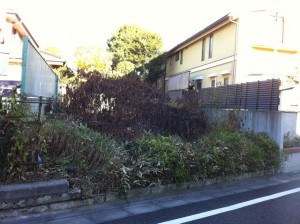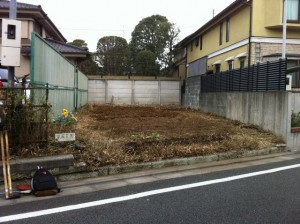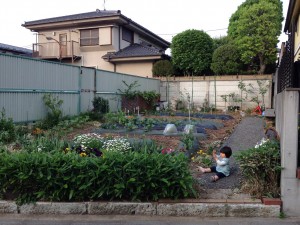It has always been a yearning for the Japanese to own a piece of land. In fact, a house is often called “my dream home”. Meanwhile, housing and land are gradually becoming redundant as the stock of social overhead capital piles up against the aging population with fewer children.One logical answer would be to demolish or sell these vacant buildings. But human nature keeps people from selling special lands and homes left by their dear ancestors, as well as those filled with their own nostalgic childhood memories. This is why we often see vacant houses and vacant lots after old buildings have been demolished.
These vacant spaces are a common site not only in downtown Tokyo, but also in residential areas throughout Japan.
This photo is how a vacant spot in my neighborhood looked. Every time I passed by this vacant lot, the view discomforted me. But for years, I simply told myself that it was not my place to decide what should be done on land owned by someone else.
At some point, though, my conviction – wherever there is a problem, there is an opportunity – grew strong enough and I decided to do something about this situation.
In fact, I love gardening and have been enjoying planting vegetables and flowers on verandas in my apartment. My biggest struggle was having enough space –I had to resort to hanging plants from my verandas.
Searching for a solution, it dawned on me: “This vacant lot overrun with weeds is not being used by anyone, but apparently the soil is quite fertile. And it’s an ideal location for our kitchen garden if we just tidy it up!”
I then went a step further and put myself in the shoes of the land owner. Such an abandoned piece of land with uncontrolled weeds full of bugs can cause troubles to the neighbors and attract the occasional dumping of garbage. Clearing the weeds costs a lot each season, not to mention cleaning the road in front of the land. It did not take too much imagination to list the possible headaches all this could cause the owner.
A nice piece of land was discovered after clearing the weeds.
So, I found the owner family by using the public figure and land register and proposed a solution to the current condition – namely, I “manage” the land for free as a kitchen garden and thereby revive it as a “beloved space in the community” on their behalf.
This proposal was inspired by the tenet of Japanese merchants from the Omi region to seek “a win for everyone”, that is, to achieve a “win-win-win” among the seller, customer, and society, in line with the following reasoning:
– For any business to make sense, the seller must make a profit
– The customer must be happy with the deal and feel its benefit
– Every business is made possible thanks to the trust and support of the community. Therefore, the business must be made to develop the community and promote its welfare.
Though my proposal was not a business deal, the principle of “a win for everyone”, that is, a win for the owner family, a win for the user, and a win for the community, still played a crucial role in achieving an agreement:
– The owner family can save themselves the trouble and expense of clearing the weeds. As the land is always kept tidy and looked after by a trusted person as a kitchen garden, the family need not worry about litter, the disposal of weeds, the cleaning of the road in front of the land, and so on. Importantly, all the above are done for free.
– As a user, I can enjoy the use of prime real estate in downtown Tokyo as a kitchen garden. Of course, it requires effort to clear weeds and turn wild land into a nice kitchen garden. But for anyone like me with a pioneering spirit, building your “own farm” from scratch is an excellent way to fulfill your natural longings. For some, maintaining and managing a piece of land involves only onerous tasks. For born gardeners, however, cleaning the garden and then enjoying watching flowers grow is as natural as breathing air. Besides, we later have the real benefit of our own vegetables on the dinner table.
– The neighbors get to enjoy a better environment. The messy overgrown piece of land which only irked them before can now entertain them with flowers and vegetables that grow day by day. Because I committed to managing the property, I clean the road in front of the land. My relationship with the neighbors is only getting better thanks also to the shared harvest from this kitchen garden.
Every day, our daughter looks forward to playing in this kitchen garden and chasing after butterflies and picking strawberries…
To date, everybody is happy with this kitchen garden. Yet I must stress that shared interest in making a deal may not suffice to establish a relationship if the lender and the user have no trust in each other’s sincerity. Unlike a formalist and businesslike land-lease agreement, our deal is based more on the kindness of the owner family, who let me “manage” the land. I believe that such users need to respect the owners’ emotional attachment with their dear homelands by committing to return the lands whenever the owners so wish.
In my specific experience, the agreement to achieve “a win for everyone” was reached primarily thanks to the generosity of the owner family, to my success in communicating my commitment to responsibly and dutifully manage the land on their behalf, and to the fact that such effort was a pleasure instead of a burden for me.
I encourage any aspiring gardeners with enough drive, energy, and sense of responsibility to go ahead and pioneer their own kitchen garden.
Actually, this is also the very goal of our Tokyo Synergy Office – to harness a win-win relationship between users and the provider for the benefit of society.
(Author: Tatsuo Hayashi, Tokyo Synergy Office)


